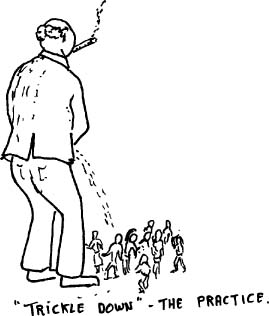An Economic Agenda for the GOP
Republicans need to be pro-market, not pro-business.
Luigi Zingales, City Journal, Autumn 2009
The success of the Republican platform went well beyond the voting booth, of course. The war against the evil empire brought the collapse of Communism and the democratization of the Soviet Bloc countries. During the Reagan years, the battle against the state led to a negative real growth rate in nondefense public spending. Deregulation freed the economy from excessive constraints and, together with tax cuts, sparked enormous entrepreneurial and creative forces. A golden era of economic growth began in the early eighties and continued, aside from a few minor recessionary interludes, until 2007—a quarter-century of unparalleled prosperity. After the Reagan economic reforms kicked in, the United States grew by an average of 3 percent each year, against Germany’s 1.9 percent, France’s 2.1, and Italy’s 1.8.
Not only did this revolution allow the U.S. to outpace Europe in income and productivity; it also transformed the country from a manufacturing economy into an innovative, high-powered service economy. Today, America does not produce iPhones, but it generates the technology and the design that permit a piece of plastic to sell for $300. It does not manufacture microchips, but it creates the technology that lets some wafers of silicon sell for thousands of dollars apiece. It does not build computers, but it develops the operating systems that run them. This transformation has enabled the United States to face the competition of emerging countries from a position of strength.
Let’s line up just three points.
(A) republican policies had successes too:
1. Deregulation and tax cuts sparked enormous entrepreneurial and creative forces
2. …transformed the country from a manufacturing economy into an innovative, high-powered service economy.
If we overlook the two recessionary bookends (1979-1984 / 2007+) and also overlook the crucial monetary policy—and its consequences—Reagan supported to wring out stagflation after he took office 1981, and, if we don’t know anything about supply side economics, still, #1 and #2 distinguish themselves to be, potentially, bald mythologizing about what ‘economic glories’ Reagan(ism) actually accomplished.
The truth of the matter revolves around another term, trickle-down economics. It’s employed to get at what a true narrative might make explicit: what actually resulted; who were the winners and losers. Is there, from this analysis, anything left of the twin assertions #1 and #2?
Now City Journal has long carved out its position in the rightward intellectual spectrum: seemingly sophisticated conservative cant.
I’ll forgive Zingales his ideological economic control panel, where, if you dial factors in just right, the economy booms. Business cycles exist on large scales and so to isolate ideological adjustments and simply assert. ‘this is how it should work,’ runs into various counterfactual, and the falsifying history. Such as, when the economy comes to boom, yet income tax rates are sky high. Ummm, this has happened.
Zingales’s narrative isn’t about either what happened between 1985-2007, or, what caused those happenings. You could set yourself to the task of figuring out what an accurate narrative would state to be the actuality of economic Reaganism.
I guarantee this accurate narrative would be troubled to serve ideological goals. But, it would be true enough compared to the seemingly sophisticated, anti-intellectual, garden variety posturing and mythologizing Zingales has somehow extracted from the facts.
(Ha. I doubt Zingales gave any consideration to the facts.)
Rates of taxation and regulation may vary, but trickle down remains, for the time being, the core commitment of our executive economic policy making ethos, irrespective of party.
fyi
“innovative, high-powered service economy” didn’t reach Cleveland, Detroit, Buffalo, Toledo, etc.. Economic myth-making can come to instrumentally serve vast money-making regimes, as when it was recently supposed that housing prices would rise forever; that hedges can be perfected; that randomness itself can be mathematically purged from predictions…on and on.

